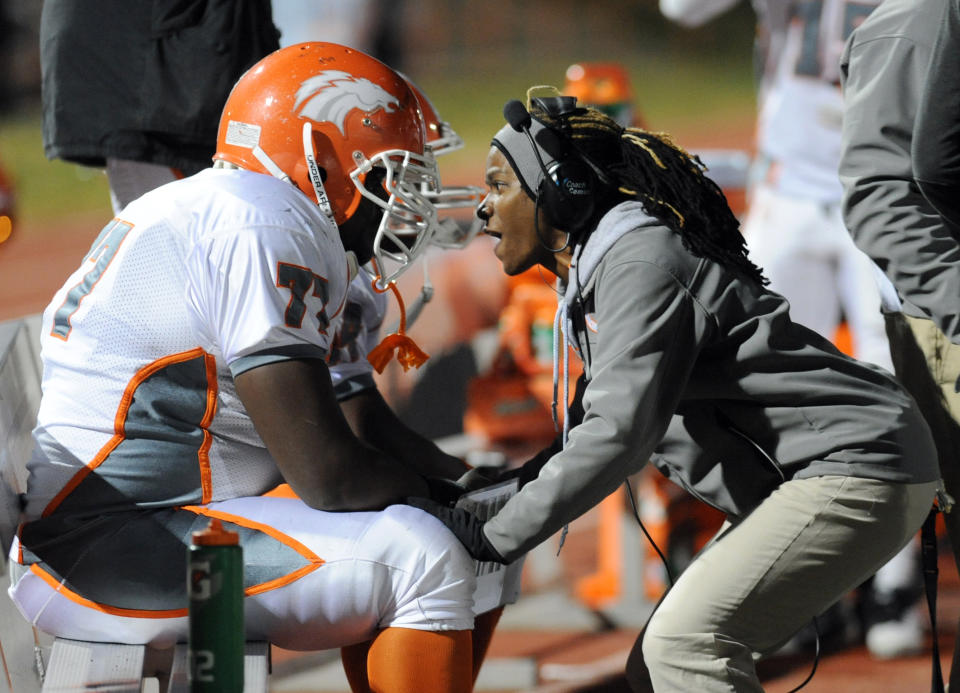Women in Football: A chat with Natalie Randolph, a pioneer in high school football
Former Coolidge High School football coach Natalie Randolph drew a flurry of media attention when she became one of the first women to coach a men’s varsity team. Randolph emphasized academic success as a goal under her tenure with the Washington D.C. school, and, while her team finished 16-26 under her tenure, she became most known for her commitment to the team and her support for her players overall well-being.
Now, four years after her last season with the team, Randolph reflects on her experience and offers her thoughts on the growth of women’s involvement in football. She now works as the Senior Women’s Administrator and Title IX coordinator for the DC Office of the State Superintendent of Education (OSSE) and speaks on panels and conferences about her experience coaching football and competing as an athlete on a Women’s Football Alliance team in Washington, D.C.
[WOMEN IN FOOTBALL SERIES: How far can female kickers go? • The challenges that face amateur players • Grade-school girls develop an early love for the game • Making female football history in Hawaii • Beth Mowins, Gayle Sierens and broadcasting’s biggest hurdle]
How long do you think it will take for girl’s tackle football to be offered nationwide?
Randolph: Well, right now, a lot of places like DC have flag football. I think that tackle football will take a bit longer because tackle football for boys and men is already under the concussion cloud, and, in the patriarchal society that we live in, it is going to be tough for people to put their girls in that situation at a younger age. I don’t know, I think that girls are definitely interested, it would be more of a question of are the parents interested and are they willing. In order for it to happen in college, it has to happen in high school. There are larger number of girls playing with the boys, but that has risks because of the physical differences.

What would you say to young girls aspiring to a career in football, whether it is as a player, a coach, an administrator, etc.?
I say go for it, as long as you have the drive, there is nothing to stop you. We live in a society where more people are taking risks against social norms so I would say go for it. In the total realm of playing, I would say be cautious. For women over 18, there are a lot of options for women that want to play. More girls should get involved in a general sense.
It’s been over seven years since you became the nation’s first female high school football coach. Looking back, what stands out the most to you about your journey in that role?
I don’t know, there was so much, it was crazy, it was difficult, it was hard, it was great, every single adjective could be attributed to that experience, both good and bad. I guess it showed me what I am passionate about which is helping student athletes reach their potential. It let me affect the lives of a lot of great students. I still have those relationships, so I’m grateful for that. I feel like now I can do anything, I got through that.
I read that you’ve always loved football and played for the DC Divas. I went to school in DC, so I’m somewhat familiar with the team but not completely. What was it like playing for the Divas?
It was great, it was one of the greatest experiences I’ve had so far. The team was amazing, we were very close as a team. Learning the sport, playing football is a different experience for women because you don’t learn it as kids. A lot of the time for women that started when I did, football is the first time that you are hitting someone with all of your force, it’s a good experience. It was awesome, I would not trade it for the world. I wish I could still do it, my body tells me no, it was one of the most fun and fulfilling experiences.
You’ve said publicly on panels that you don’t want people to avoid seeing gender or race. How long do you think it will take it sports before people will see gender and see equality?
I mean, it will always be a struggle, but we achieve more when we don’t hide it. It does matter, it’s okay that it matters. How can we use those difference to make whatever goal more achievable? I believe that. We try to run from these issues too much. We think ‘oh this happened because I’m a women and black,’ saying those words is taboo is not taboo. I am here because of who I am and what I look like. I think that when we try to pretend like people don’t do that, that’s when we go back. It will take longer if we keep pretending like these issues don’t exist.
How do you stay so positive and driven despite what I know must have been a really challenging journey as a coach, an educator, and a speaker?
Kind of either that or die of a panic attack, I didn’t have a choice. The kids kept me grounded knowing that they needed this kept me going most of the time and kept me from slipping out to the point that I wouldn’t be effective. The desire was there to quit or go crazy on someone or any of those irrational feelings. Those situations happened every day. The kids kept me grounded, and I knew that if this is going to go right for them, I have to get myself together. I was able to able to have a student-athlete experience, but they were living it now.


